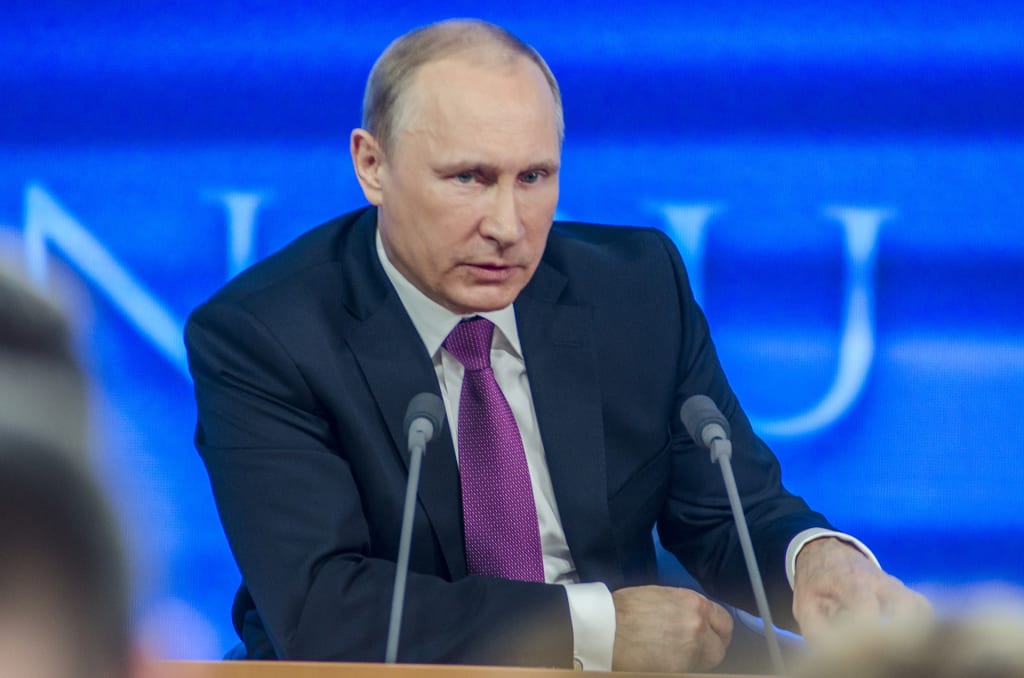Is Vladimir Putin out of his mind?
In light of recent events in Ukraine, some have begun to question the sanity of Russian President Vladimir Putin. With the way Putin has played his hand with regard to Crimea, many feel that he’s not thinking clearly about what it means for the long-term stability of Russia and Europe

Is Putin out of his mind?
How close is the northern Bambi-slayer to "another world" in terms of communication? Or does Putin have a mental breakdown?No, he's not. According to Western media, the current state of the world is predicated on whether or not Putin is (in)sane. Many still believe that Putin is insane, crazy, and irrational.Both he and he haven't are correct.
Russian infra-mysticism is the key to understanding Putin.
Despite Bloomberg's assertion that "He is not crazy, he is just a member of the KGB," we still need to go deep into the dark realms of consciousness and metaphysics to understand this creature's motivation. Traditional Christian spirituality and visionarism, which often veer dangerously close to pshychotism, are shunned by intellectuals in Protestant-spirit countries.
"You can't understand Russia with your mind," uttered by one of Russia's greatest writers, Tyutchev, has since become a proverb.
That being said, it was true that Russian leaders had often defied Western attempts to rationally predict or understand their actions, particularly those of the tsars and other gensecs.
In the minds of Anglo-Saxons, who ask, "Is Putin a rational player? ", Putin's actions appear illogical or controversial. As
That's exactly what German Chancellor Angela Merkel said about Vladimir Putin, who she described as "in another world."
Russian mystic Daniil Andreev, famous in the East but little known in West, described this Tsarist rationality as being influenced by (and, in some cases, being controlled by) a "demon of the imperial state" in his treatise "Rose of the World" and outlined the distinctive characteristics that define its logic.
We can use Andreev's image as a grave metaphor for different rationality, but you don't have to believe in real or "physical" demons. In contrast to human rationality, the "demon of the imperial state" (its name is uitsraor "Zhrugr") has different goals and values. The Devil
in Russia, these seemingly irrational things—state pride, happiness from other countries being scared of yours, stately cults, and military parades—consume the emanations of human emotions like these: pride in the state (not the country or nation, but the state-machine). In other words, I'm referring to things like the Russians' willingness to live a miserable life but with a sense of superiority over everyone else in the Russian state-power, army, culture, and religion, and their silly cult of World War 2.
There are no Russians who crave love; they are content only when their neighbours or the entire world is afraid of them.
Russia's conflict with Ukraine is an excellent example of this psychology in action today.
People of Ukrainian descent have a large number of Russian ancestors as a result of the population-mixing practises of the USSR, and this has led to a dramatic rise in Russian hostility toward their relatives in Ukraine, a result of the strong propaganda and emotions feeding the Russian demon. This has been a traumatic and difficult experience for us to comprehend.
According to Andreev, this influence over people's minds does not come solely from watching television. The demons are always in control of a great country's president.
This means that the "dark seer" is not always aware of what is going on, that the imperatives and impulses that run through his mind are not necessarily his own. In fact, Uitsraor stifles the parts of his will that are in opposition to hers.
Because of this, Andreev dubbed Stalin "the future Antichrist on a training mission," hinting at his upcoming incarnation. Andreev's spiritual experience supported the idea of reincarnation, even though he was a Christian. It's not about Putin, of course, but you can see that Putin's actions are politically and economically stupid – he attempts to conquer the poor pro-Russian regions of Ukraine, which could never feed themselves. Donbass and Crimea are in dire need of substantial financial assistance, which will fall on the Russian economy and people. Russia is under heavy economic sanctions and will face well-armed foes on its Western borders after this conflict.
Uitsraor and the state-propaganda machine influenced by him have had a profound effect on the Russian population for many years. Despite the fact that a Russian may not have a washing machine or a toilet outside his house, he or she will support a tsar/president who sends a message that the world is afraid of Russians and that all the countries are plotting against Russians (the state prop does it quite often).
In other words, neither Russia nor its people benefit from the war. It will only make them poorer. Why, then, do they adamantly back the conflict in Ukraine? A demonic influence over imperial populations is what Andreev refers to as Andreev's "demon-power."
Russian sectarian movements have long been infused with a subliminal sense of the tsars' demonization. This morning, a mystic known as Vissarion announced that Lenin is the Antichrist. His new religious movement has inspired more than 5,000 people to leave their normal lives and relocate to his "City of Sun" in the Siberian forests. For the same reason Andreev had his visionary experiences of various realms of existence.
What matters to us is that Putin's logic is based on uitsraor with his own interests in mind. Over the course of centuries, Russia had developed a system for feeding their state demons. Stalin used them as a weapon of mass destruction during World War II. — In creating a negative public perception of Ukraine, Russian propaganda draws heavily on World War II imagery and tropes that have been dispelled nearly seven decades ago. There are references to "Russia's enemies in the West" and "nazis," as well as a cold war lexicon about Ukrainians being called "fascicsts." While it may seem ridiculous to an outsider, in Russia, the populace believes that they will "free" Ukraine in the same way that they have "freed" Hungary, Chechnya, Finland, and Poland.
While Putin is "radiating" state-machine pride emotions to feed their demon, the Russian people and the entire world are trying to figure out if he's really gone insane.





Comments
There are no comments for this story
Be the first to respond and start the conversation.